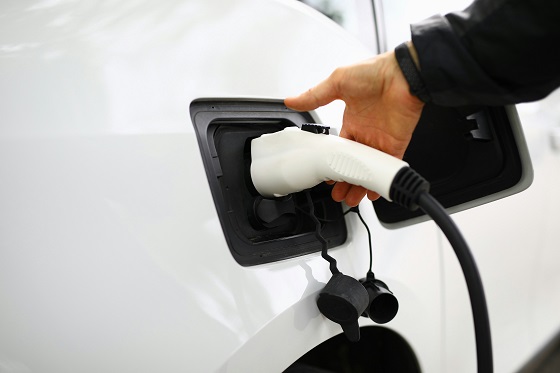Automotive
Ford Files Patent to Surveil Drivers

News release from Armstrong Economics
By Martin Armstrong
Governments are pushing the public to switch to smart vehicles to reduce fossil fuel consumption, but there is also a second motive – surveillance.
This September, Ford filed a new patent to eavesdrop on riders. They plan to share this information with third-parties to personalize the advertisements riders hear. Ford will also take the driver’s destination into consideration to determine location-specific advertisements and suggestions. The technology will factor in the weather, traffic, and all external sensors to fine tune when and what to market to passengers.
Advertisements are perhaps the least ominous use of voice data based on the plans that these car manufacturers have. Car insurance rates in the United States spiked 26% in the past year, which is partly due to car manufacturers sharing ride data with insurance companies. Even older cars with basic features like OnStar have tracking devices that report your driving behavior to the manufacturers who share your data with insurance companies and, ultimately, the government. LexisNexis, which tracks drivers’ behaviors and compiles risk profiles, has been sharing individual data with General Motors, who passes that information along to the insurance companies. General Motors.
One driver demanded that LexisNexis send him his personal report, which was a 258-page document containing every trip he or his wife took in his vehicle over a six-month period. LexisNexis said that this data will be used “for insurers to use as one factor of many to create more personalized insurance coverage.” They even reported small issues such as hard breaking and rapid acceleration, according to the report. “I don’t know the definition of hard brake. My passenger’s head isn’t hitting the dash,” an unnamed Cadillac driver enrolled in the OnStar Smart Driver subscription service told reporters.
“Cars have microphones and people have all kinds of sensitive conversations in them. Cars have cameras that face inward and outward,” a researcher with Mozilla Foundation told the Los Angeles Times. In fact, 19 automakers in 2023 admitted that they have the ability to sell your personal data without notice. Law enforcement may subpoena these records as well.
Ford claims that the patent was submitted, but they do not necessarily plan to use the technology. “Submitting patent applications is a normal part of any strong business as the process protects new ideas and helps us build a robust portfolio of intellectual property. The ideas described within a patent application should not be viewed as an indication of our business or product plans. No matter what the patent application outlines, we will always put the customer first in the decision-making behind the development and marketing of new products and services,” Ford said in a statement released to MotorTrend.
Now, the US Department of Transportation is permitted to mandate that certain manufacturers provide them with vehicle data. Sens. Ron Wyden of Oregon and Edward Markey of Massachusetts testified that all vehicles in the United States with a GPS or emergency call system are collecting travel data that car manufacturers have remote access to via the computer chips. The computer chips are compiling data on vehicle speed, movement, travel, and even using exterior sensors and cameras to record the vehicle’s location.
All of this violates the Fourth Amendment which protects against unreasonable searches and seizures without probable cause. These car manufacturers are surpassing what anyone would consider a reasonable expectation of privacy. Governments, third-party advertisement companies, and insurance companies all have warrantless access to personal data, and drivers are largely unaware they are being spied on. Section 702 of the Foreign Intelligence Surveillance Act permits the government to have backdoor access to this data.
The aforementioned senators’ concerns fell on deaf ears at the Federal Trade Commission. The Department of Transportation clearly is not listed within the US Constitution. People are already experiencing stiff consequences from autos sharing data with the sharp uptick in insurance rates.
Automotive
Major automakers push congress to block California’s 2035 EV mandate

 MxM News
MxM News
Quick Hit:
Major automakers are urging Congress to intervene and halt California’s aggressive plan to eliminate gasoline-only vehicles by 2035. With the Biden-era EPA waiver empowering California and 11 other states to enforce the rule, automakers warn of immediate impacts on vehicle availability and consumer choice. The U.S. House is preparing for a critical vote to determine if California’s sweeping environmental mandates will stand.
Key Details:
-
Automakers argue California’s rules will raise prices and limit consumer choices, especially amid high tariffs on auto imports.
-
The House is set to vote this week on repealing the EPA waiver that greenlit California’s mandate.
-
California’s regulations would require 35% of 2026 model year vehicles to be zero-emission, a figure manufacturers say is unrealistic.
Diving Deeper:
The Alliance for Automotive Innovation, representing industry giants such as General Motors, Toyota, Volkswagen, and Hyundai, issued a letter Monday warning Congress about the looming consequences of California’s radical environmental regulations. The automakers stressed that unless Congress acts swiftly, vehicle shipments across the country could be disrupted within months, forcing car companies to artificially limit sales of traditional vehicles to meet electric vehicle quotas.
California’s Air Resources Board rules have already spread to 11 other states—including New York, Massachusetts, and Oregon—together representing roughly 40% of the entire U.S. auto market. Despite repeated concerns from manufacturers, California officials have doubled down, insisting that their measures are essential for meeting lofty greenhouse gas reduction targets and combating smog. However, even some states like Maryland have recognized the impracticality of California’s timeline, opting to delay compliance.
A major legal hurdle complicates the path forward. The Government Accountability Office ruled in March that the EPA waiver issued under former President Joe Biden cannot be revoked under the Congressional Review Act, which requires only a simple Senate majority. This creates uncertainty over whether Congress can truly roll back California’s authority without more complex legislative action.
The House is also gearing up to tackle other elements of California’s environmental regime, including blocking the state from imposing stricter pollution standards on commercial trucks and halting its low-nitrogen oxide emissions regulations for heavy-duty vehicles. These moves reflect growing concerns that California’s progressive regulatory overreach is threatening national commerce and consumer choice.
Under California’s current rules, the state demands that 35% of light-duty vehicles for the 2026 model year be zero-emission, scaling up rapidly to 68% by 2030. Industry experts widely agree that these targets are disconnected from reality, given the current slow pace of electric vehicle adoption among the broader American public, particularly in rural and lower-income areas.
California first unveiled its plan in 2020, aiming to make at least 80% of new cars electric and the remainder plug-in hybrids by 2035. Now, under President Donald Trump’s leadership, the U.S. Transportation Department is working to undo the aggressive fuel economy regulations imposed during former President Joe Biden’s term, offering a much-needed course correction for an auto industry burdened by regulatory overreach.
As Congress debates, the larger question remains: Will America allow one state’s left-wing environmental ideology to dictate terms for the entire country’s auto industry?
Also Interesting
Top Used Ford SUVs for Families and Adventurers

Finding the perfect SUV that balances comfort, safety, and adventure-ready performance can be a challenge, but Ford’s lineup of used SUVs offers some of the best options available. Whether you need a spacious vehicle for your growing family or an all-terrain companion for weekend getaways, there’s a Ford SUV to match your lifestyle. Let’s explore the top choices that deliver reliability, versatility, and affordability.
What to Look for in a Used Ford SUV?
Before diving into specific models, it’s essential to know what features matter most when shopping for a used Ford SUV. Here are key factors to consider:
● Safety Features – Look for models equipped with Ford Co-Pilot360, which includes automatic emergency braking, blind-spot monitoring, and adaptive cruise control.
● Reliability and Maintenance Costs – Research common issues and ensure the SUV has a solid maintenance history.
● Fuel Efficiency – Choose a model that aligns with your commuting or road trip needs.
● Cargo and Passenger Space – Ensure the SUV has enough room for your family, gear, and pets.
● Off-Road Capability – If adventure is your goal, opt for models with all-wheel drive (AWD) or four-wheel drive (4WD).
If you’re ready to explore available options, check out https://stampedeauto.com/used-ford/ for a selection of quality used Ford SUVs.
1. Ford Escape – The Compact Family Favorite
The Ford Escape is a practical, fuel-efficient SUV perfect for small families and urban explorers. With a history of strong safety ratings and a spacious interior, it strikes a balance between convenience and performance.
Why Choose a Used Ford Escape?
● Fuel Efficiency – Older models with the 1.5L EcoBoost engine offer up to 30 MPG highway.
● User-Friendly Technology – Equipped with Ford SYNC infotainment and smartphone connectivity.
● Versatile Cargo Space – Fold-flat rear seats provide ample room for groceries, sports equipment, or luggage.
● Best Model Years to Buy – 2018-2021 models have modern safety features and improved fuel economy.
2. Ford Edge – The Perfect Mid-Size Balance
For those who want more space without stepping into full-size territory, the Ford Edge is an ideal midsize SUV. It offers a roomy two-row layout, strong engine options, and a smooth ride.
Why Choose a Used Ford Edge?
● Spacious Cabin – More rear legroom than many competitors.
● Powerful Engine Choices – Available 2.0L EcoBoost and 2.7L V6 for extra performance.
● Advanced Safety Features – Includes lane-keeping assist and pre-collision assist in newer models.
● Best Model Years to Buy – 2019-2022 models offer a modern design and strong reliability.
3. Ford Explorer – The Ultimate Family SUV

If you need three rows of seating without sacrificing performance, the Ford Explorer is a top contender. It’s an excellent SUV for large families and those who need extra passenger capacity.
Why Choose a Used Ford Explorer?
● Seating for Up to Seven – Third-row seats offer flexibility for larger families.
● Strong Towing Capacity – Can tow up to 5,000 lbs when properly equipped.
● Powerful Yet Efficient – The 2.3L EcoBoost engine delivers a balance of power and fuel savings.
● Best Model Years to Buy – 2017-2022 models feature advanced driver assistance and improved comfort.
4. Ford Expedition – The Full-Size Powerhouse
For those who need maximum space and towing capability, the Ford Expedition is a standout choice. It’s built for large families, cross-country road trips, and hauling heavy loads.
Why Choose a Used Ford Expedition?
● Room for Eight – A full-size SUV with unmatched passenger space.
● Towing King – Can tow up to 9,300 lbs, ideal for boats and trailers.
● High-Tech Features – SYNC 3 infotainment and multiple USB ports keep everyone connected.
● Best Model Years to Buy – 2018-2022 models have turbocharged efficiency and refined interiors.
5. Ford Bronco Sport – The Adventurer’s Compact Choice
For outdoor enthusiasts, the Ford Bronco Sport is a rugged compact SUV designed for off-road fun while still being a practical daily driver.
Why Choose a Used Ford Bronco Sport?
● Trail-Ready Performance – Standard AWD and off-road modes for different terrains.
● Compact Yet Spacious – Clever storage solutions for camping and gear.
● Turbocharged Engines – 1.5L and 2.0L EcoBoost options for strong performance.
● Best Model Years to Buy – 2021-2023 models provide the latest tech and rugged styling.
Before purchasing a used Ford Bronco Sport, be sure to check for any recalls. For example, certain Ford Bronco Sport and Maverick models have been recalled to fix faulty batteries. To learn more about this, visit Consumer Reports’ coverage on the recall.
Buying Tips: How to Get the Best Deal on a Used Ford SUV
● Certified Pre-Owned (CPO) Options – Ford’s CPO program includes extended warranties and inspections.
● Check Vehicle History Reports – Avoid SUVs with major accidents or unresolved recalls.
● Test Drive and Inspection – Always inspect brakes, transmission, and suspension.
● Compare Prices – Look at local dealerships and online marketplaces for the best deals.
● Negotiate Smartly – Research market value and be prepared to walk away if needed. It also helps to choose a used car dealer with transparent pricing and a solid reputation.
Conclusion
Choosing the right used Ford SUV depends on your specific needs. If you want fuel efficiency and city-friendly size, the Escape is a great choice. For those needing extra space and towing power, the Explorer or Expedition are top contenders. If adventure is a priority, the Bronco Sport
offers unbeatable off-road capability.
No matter which Ford SUV you choose, you’ll get a reliable vehicle that blends comfort, technology, and performance—without the high price tag of a new model. Start your search today and find the perfect used Ford SUV for your family or next adventure.
-

 Alberta14 hours ago
Alberta14 hours agoNew Alberta Election Act bans electronic vote counting machines, lowers threshold for recalls and petitions
-

 Alberta13 hours ago
Alberta13 hours agoHours after Liberal election win, Alberta Prosperity Project drumming up interest in referendum
-

 Alberta21 hours ago
Alberta21 hours agoPremier Danielle Smith responds to election of Liberal government
-

 Banks14 hours ago
Banks14 hours agoTD Bank Account Closures Expose Chinese Hybrid Warfare Threat
-

 Automotive2 days ago
Automotive2 days agoMajor automakers push congress to block California’s 2035 EV mandate
-

 Business2 days ago
Business2 days agoNet Zero by 2050: There is no realistic path to affordable and reliable electricity
-

 Autism2 days ago
Autism2 days agoUK plans to test children with gender confusion for autism
-

 COVID-192 days ago
COVID-192 days agoFormer Australian state premier accused of lying about justification for COVID lockdowns


